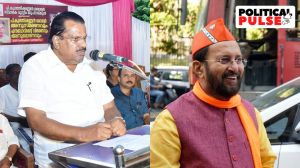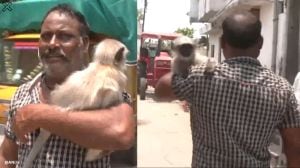- India
- International
Bagalkot, where voters aren’t
Despite NREGA, men and women migrate out of villages in the district, leaving only the elderly or the very young.
Every day, trucks arrive from cities such as Mangalore and Bangalore to take back farmers and their wives from Hulikere village in Badami taluk of the north Karnataka district of Bagalkot, one of the most impoverished in the state. Only the elderly and young children remain. Despite programmes such as NREGA, farmers flee the dry lands around Bagalkot to work as construction workers, cement loaders, painters and labourers in cities in Karnataka and Goa.
“There is a truck leaving Hulikere every night for the cities. These days, there are as many as four trucks,’’ said Bibi Jan, an anganwadi worker in Hulikere. In Hulikere village, of the 1,500 voters — mostly SCs, backward castes and tribals — barely 300 are home to cast their votes on April 17. The rest are away toiling in cities, hoping to return home by the time the rains arrive in June with about Rs 70,000 in hand — that is, if both husband and wife find work.
“We often joke that this is a good time for thieves to visit our village because only the old, the sick and the children remain. That the thieves will have nothing to steal is another thing,’’ says Basappa Gournor, a Hulikere farmer back in the village on a short break from a construction job in Udupi. He is home for the new year festival of Ugadi and is waiting for a truck to ride out again.
“This is a dry land and there is little we can do in the summer. NREGA offers jobs but is riddled with corruption and there is no guarantee on payments. I earn much more in Udupi loading trucks with onions, rice and other material,’’ says Shiva Suri, 21, a dropout from Hulikere who is home on a short break.
Across villages in Bagalkot, the story has been the same in recent times.

“Most people in this region are landless or have small holdings. When we migrate, it is mostly to work at construction sites for which we get paid about Rs 400-500 a day. We live in small tents that we put up in empty areas rented out around the construction sites. It is very hard on our families, children and their health but at least we earn a livelihood and we can return home by the monsoon,’’ says Hulikere’s Basappa Gournor.
In some villages such as Thougansi in the Kotakal gram panchayat in Badami, the migration has been arrested following the intervention of an agricultural workers’ union called Grakoos that has empowered people in the village to demand their rights under NREGA, leading to work allocation on demand and prompt payments.
“Two years ago, my son, my daughter-in-law and I were working in Mangalore at a construction site. They make us work from 8 am to 8 pm. If there are children, their education gets affected. NREGA wages may not be the same as the construction jobs but it is more satisfying when it works well,’’ says Paravasi, 43, of Thougansi village, where people are waiting for the election code of conduct to lapse this month to be allocated fresh work by the gram panchayat.
Thougansi village was initially reluctant to adopt NREGA but took to it after realising that panchayats are duty bound under the Act to provide jobs on demand, says Yamunnava Poojary, 26, a differently-abled, Scheduled Tribe woman who has worked to spread awareness of villagers’ rights under NREGA.
However, in most villages around Bagalkot, knowledge of NREGA is almost non-existent, leaving families exposed to the harshest of existences if they are unable to migrate.
In Haragoddinne village in Hungund taluk, Renuka Koppa, a 45-year-old mother of four whose husband died of alcoholism, lost her house to a flood that hit villages on the banks of the Malaprabha river in Bagalkot in October 2009. Four years later, she is yet to get an alternative home and is among 50 families who continue to live in temporary sheds built for the flood affected.
“It is a nightmare living in these steel sheds. It’s so hot that nothing I cook stays for more than an hour. There are no toilets. Our newborns and pregnant women sleep in the open because it is stiflingly hot,’’ she said.
Koppa heard of NREGA about six months ago when she was talking to someone from another village. “I went around inquiring how we can bring it to our village because for people like me, it would be a boon,’’ she said.
Now, 50 families in Haragodinne avail work under NREGA. Recently, they worked on repairing a road. But the village is yet to fully understand the scheme and has now roped in Grakoos.
In Hangaragi, the experience with NREGA has been bitter. People in the village are complaining of an average of 10 man days of work being unpaid while the panchayat office claims to have made those payments.
“The panchayat has not made payments for work we did on cutting a road. They paid somebody else for our work. We have no option but to go looking for jobs elsewhere,’’ says 50-year-old Channava Badiger who did NREGA work after suffering burns in a local brick factory.
For most people in the north Karnataka region who struggle for their livelihood, the forthcoming election to the Lok Sabha has little significance. In Haragodinne, Renuka Koppa, for instance, did not know who Narendra Modi was until her six-year-old son intervened to tell her that he had seen him on their neighbour’s television and that he is in a big fight with Rahul Gandhi.
Apr 26: Latest News
- 01
- 02
- 03
- 04
- 05








































